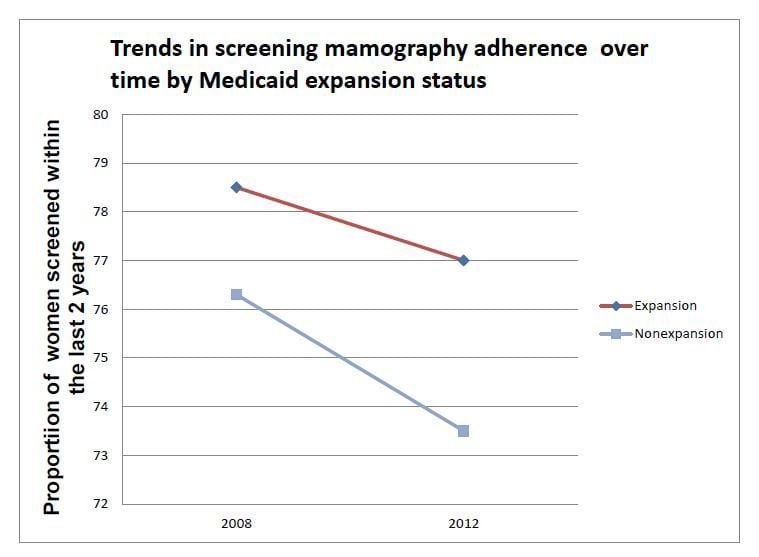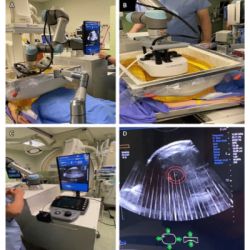Introduction of the Affordable Care Act (ACA) in the United States has enabled more women to come forward for breast cancer screening, according to a study that will be presented at the Radiological Society of North America (RSNA) annual meeting today. Improved access to breast cancer screening was observed in those states that took the option to expand Medicaid to provide coverage to people under 65.
States that adopted and implemented the expanded Medicaid programme included California, Connecticut, Minnesota, New Jersey, Washington and Washington, DC. Medicaid is the social healthcare programme for people on low incomes, and states could choose to expand coverage to people under 65 living at up to 133 percent of the defined federal poverty level (FPL). The FPL is issued annually by the Department of Health and Human Services, and is currently $11,770 for individuals and $15,930 for a family of 2.
Lead author Soudabeh Fazeli Dehkordy, MD, MPH, from St. John Providence Hospital in Southfield, Michigan, notes that there is still substantial disparity in breast cancer screening in the United States, despite the fact that increased use of screening mammography has contributed significantly to improved breast cancer detection. Their study sought to find out if increased access to health insurance though expansion of Medicaid resulted in improved breast cancer screening adherence.
Their analysis used data from the 2008 and 2012 Behavioral Risk Factor Surveillance System, which is a system of health-related telephone surveys that collect state data about residents regarding their health-related risk behaviours, chronic health conditions and use of preventive services. Once adjusted for age, education, income and race, the analysis showed that low-income women in expansion states had a similar likelihood of being screened to those in non-expansion states in 2008. In 2012, however, following programme implementation in the the early expander states, low-income women in expansion states were 25 percent more likely to be screened for breast cancer than in 2008.

Image credit: Soudabeh Fazeli Dehkordy
"Understanding the impact of Medicaid expansion on breast cancer screening rates in early expander states can provide valuable insights that can be very useful to both state and federal policymakers when considering key health policy," Dr. Fazeli Dehkordy said.
See Also: Breast MRI after Mammography May Detect Additional Aggressive Cancers
Currently, 23 states have opted to expand Medicaid coverage, while six others are implementing alternatives. The remaining states elected not to implement the expansion program or are still in the process of considering it.
"Adoption of Medicaid expansion by more states can result in considerable improvement of disparities in breast cancer screening, leading to better health outcomes for all women across the United States," Dr. Fazeli Dehkordy added.
Co-authors on the study were Kelli Hall, PhD, Brady West, PhD, Vanessa Dalton, MD, and Ruth C. Carlos, MD, MS.
When and Where
Dr. Dekhordy will be presenting their poster at the Health Service, Policy and Research Community section in the Learning Center, Hall D, Station 2 between 12.15 and 12.45 on Monday. The poster has been honoured with the Trainee Research Prize - Resident.
The Learning Center is open Monday-Thursday 7am-7.30pm and on Friday 7am-12.30pm.
Carine Khoury
Managing Web Editor, HealthManagement.org
Source: Radiological Society of North America
Image credit: Radiological Society of North America
States that adopted and implemented the expanded Medicaid programme included California, Connecticut, Minnesota, New Jersey, Washington and Washington, DC. Medicaid is the social healthcare programme for people on low incomes, and states could choose to expand coverage to people under 65 living at up to 133 percent of the defined federal poverty level (FPL). The FPL is issued annually by the Department of Health and Human Services, and is currently $11,770 for individuals and $15,930 for a family of 2.
Lead author Soudabeh Fazeli Dehkordy, MD, MPH, from St. John Providence Hospital in Southfield, Michigan, notes that there is still substantial disparity in breast cancer screening in the United States, despite the fact that increased use of screening mammography has contributed significantly to improved breast cancer detection. Their study sought to find out if increased access to health insurance though expansion of Medicaid resulted in improved breast cancer screening adherence.
Their analysis used data from the 2008 and 2012 Behavioral Risk Factor Surveillance System, which is a system of health-related telephone surveys that collect state data about residents regarding their health-related risk behaviours, chronic health conditions and use of preventive services. Once adjusted for age, education, income and race, the analysis showed that low-income women in expansion states had a similar likelihood of being screened to those in non-expansion states in 2008. In 2012, however, following programme implementation in the the early expander states, low-income women in expansion states were 25 percent more likely to be screened for breast cancer than in 2008.

Image credit: Soudabeh Fazeli Dehkordy
"Understanding the impact of Medicaid expansion on breast cancer screening rates in early expander states can provide valuable insights that can be very useful to both state and federal policymakers when considering key health policy," Dr. Fazeli Dehkordy said.
See Also: Breast MRI after Mammography May Detect Additional Aggressive Cancers
Currently, 23 states have opted to expand Medicaid coverage, while six others are implementing alternatives. The remaining states elected not to implement the expansion program or are still in the process of considering it.
"Adoption of Medicaid expansion by more states can result in considerable improvement of disparities in breast cancer screening, leading to better health outcomes for all women across the United States," Dr. Fazeli Dehkordy added.
Co-authors on the study were Kelli Hall, PhD, Brady West, PhD, Vanessa Dalton, MD, and Ruth C. Carlos, MD, MS.
When and Where
Dr. Dekhordy will be presenting their poster at the Health Service, Policy and Research Community section in the Learning Center, Hall D, Station 2 between 12.15 and 12.45 on Monday. The poster has been honoured with the Trainee Research Prize - Resident.
The Learning Center is open Monday-Thursday 7am-7.30pm and on Friday 7am-12.30pm.
Carine Khoury
Managing Web Editor, HealthManagement.org
Source: Radiological Society of North America
Image credit: Radiological Society of North America
Latest Articles
Breast cancer, screening, Affordable Care ACt
Introduction of the Affordable Care Act (ACA) in the United States has enabled more women to come forward for breast cancer screening, according to a study that will be presented at the Radiological Society of North America (RSNA) annual meeting today. Im



























